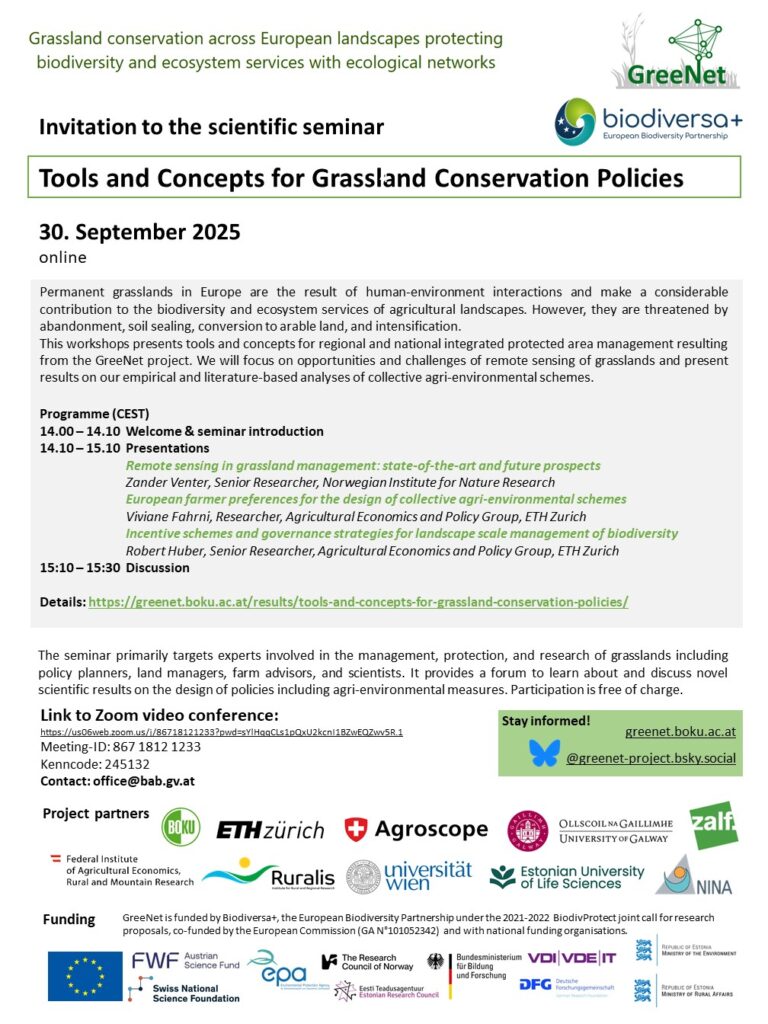Scientific Seminar, 30. September 2025, online
This workshops presents tools and concepts for regional and national integrated protected area management resulting from the GreeNet project. We will focus on opportunities and challenges of remote sensing of grasslands and present results on our empirical and literature-based analyses of collective agri-environmental schemes.
Programme (CEST)
14.00 – 14.10 Welcome & seminar introduction
14.10 – 15.10 Presentations
15:10 – 15:30 Discussion
Presentation 1: Remote sensing in grassland management: state-of-the-art and future prospects
Zander Venter, Senior Researcher, Norwegian Institute for Nature Research
Sensing information about the earth’s surface from drones, airplanes or satellites is often sold as a promising decision support tool for land managers. Remote sensing is scalable and can be more cost-effective than collecting measurements in-situ. But is remote sensing really a silver bullet solution and should we buy into the hype around it? I will present some of the recent advances in remote sensing technologies that are particularly relevant for grassland monitoring and management. Some downstream applications include grassland yield mapping and forecasting, mowing/grazing detection, forage quality estimation, weed detection, biodiversity indicators and ecosystem service models. I will also discuss some of the pitfalls and challenges associated with remote sensing and how upcoming satellite missions and advances in artificial intelligence (AI) might open new opportunities in the future.
Presentation 2: European farmer preferences for the design of collective agri-environmental schemes
Viviane Fahrni, Researcher, Agricultural Economics and Policy Group, ETH Zurich
We elicit the preferences of European farmers for different design options of collective agri-environmental schemes and assess the influence of socio-economic and behavioural factors on their willingness to participate. To this end Survey data, including a discrete choice experiment (N=636), has been collected in a cross-country analysis, comprising six European countries. We consider socio-economic drivers and behavioural factors in farmers’ assessments of these incentives. Results indicate that European farmers prefer smaller groups but show varied preferences for monitoring methods and management discretion. We find that behavioural factors, mainly risk preferences and attitudes, matter for farmer decision making in this context.
Presentation 3: Human–AI framework reveals design levers for collective landscape stewardship in agriculture
Robert Huber, Senior Researcher, Agricultural Economics and Policy Group, ETH Zurich
We present a systematic review of 96 collective agri-environmental schemes supporting landscape stewardship in agriculture across OECD countries. The review connects the analytical power of artificial intelligence in concert with expert knowledge. The synthesis enables a precise and comprehensive examination of policy and implementation dimensions, yielding critical insights into the schemes’ designs and functioning, and their broader applicability. We find considerable heterogeneity among schemes indicating flexibility for decision-makers to adapt schemes to specific environmental targets at local scale, but that there is still significant room to enhance the role of farmers as key players in collective agri-environmental schemes.

Invitation to the scientific seminar
Download: INVITATION
Link to Zoom video conference:
https://us06web.zoom.us/j/86718121233?pwd=sYlHqqCLs1pQxU2kcnI1BZwEQZwv5R.1
Meeting-ID: 867 1812 1233
Kenncode: 245132
Contact: office@bab.gv.at